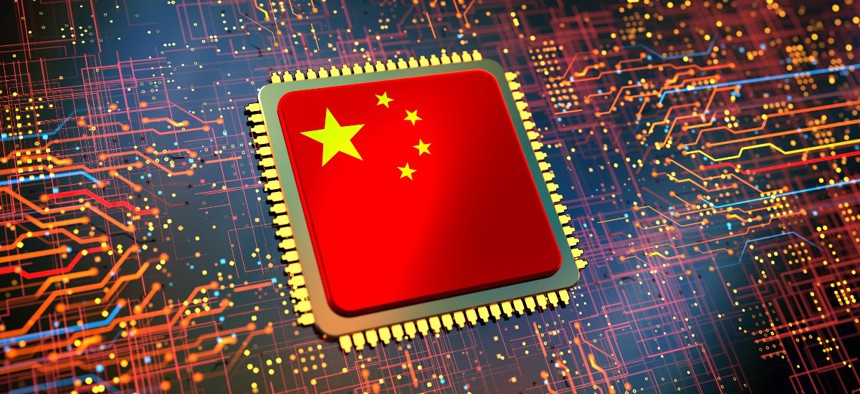US and Allies Developing Deal on Export Controls Targeting China’s Chip Access

MF3d/Getty Images
The head of the Commerce Department’s Bureau of Industry and Security “would put down money” on the U.S. implementing additional export controls on China’s access to advanced technologies.
The Biden administration expects to have “a deal done in the near-term” with U.S. allies to limit China’s access to advanced semiconductors and related equipment, according to Alan Estevez, undersecretary of Commerce for industry and security, who spoke at an event hosted by the Center for a New American Security on Thursday. He added that additional export controls on other advanced technologies remain on the table.
Officials are working to ensure that Chinese-focused export controls announced earlier this month by the department’s Bureau of Industry and Security—or BIS—are similarly implemented by other countries, Estevez said, adding that efforts to make the rules multilateral remain “a work in progress.”
BIS unveiled the new export controls on Oct. 7, saying in a press release that the “series of targeted updates” were designed to “restrict the [People’s Republic of China’s] ability to obtain advanced computing chips, develop and maintain supercomputers and manufacture advanced semiconductors.” The export controls announced by the Commerce Department—which Estevez noted were only on the “highest-end chips”—also limit China’s access to advanced semiconductors produced in other countries that utilize U.S.-made equipment.
“This was not a surprise to our allies,” Estevez said about the new export controls. “What we keep hearing is, ‘ensure that you, the U.S., also have skin in the game.’ We’ve shown that we have skin in the game. We’ve taken action and we view it as a downpayment for what we’re going to do. And the discussions we’re having are good, so I’m very bullish.”
Estevez said the export controls were part of the Commerce Department’s ongoing “China review,” which includes looking beyond semiconductors to other areas where Beijing’s actions present a potential national security threat to the U.S. and its allies. Estevez previously announced the BIS’s review of export control policies towards Beijing during appearances before the House Foreign Affairs Committee and the Senate Banking Committee in July.
“We continue to assess the effectiveness of our controls to address our national security and foreign policy concerns related to the [People’s Republic of China] and analyze whether the current threat landscape requires new action,” Estevez said in his written testimony to the Senate Banking Committee on July 14. “We are closely reviewing our approach to China, seeking to maximize the effectiveness of our controls.”
The Biden administration’s national security strategy, which was publicly released earlier this month, highlighted Beijing’s role as an adversarial competitor and noted, in part, that the U.S. “will ensure multilateral export control regimes are equipped to address destabilizing emerging technologies and to align export policies in likeminded states toward countries of concern.”
National Security Advisor Jake Sullivan also alluded to the importance of export controls in combating adversarial nations like China during remarks at a technology summit in September, saying that “they can be a new strategic asset in the U.S. and allied toolkit to impose costs on adversaries, and even over time degrade their battlefield capabilities.”
When asked during the event if the Biden administration plans to implement future export controls on other advanced technologies—such as quantum information systems, artificial intelligence algorithms and biotechnologies—Estevez alluded to Sullivan’s remarks and said “they are technology areas that are on my radar.”
“We are going to continue to look at not just semiconductors, but other areas that the Chinese are using to threaten the United States and its allies,” Estevez said, adding that “if I was a betting person, I would put down money” on the U.S. implementing additional export controls.
Estevez told the audience that the Commerce Department’s review of export control policies towards Beijing “will be done when the Chinese change their behavior.”
“I’m doing this because I have national security threats that I need to cover,” he added.






